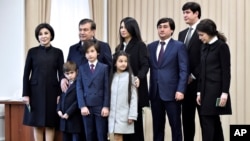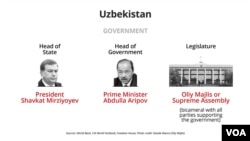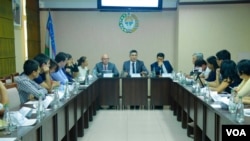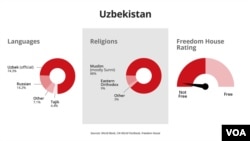Uzbek officials say a program of broad government reforms initiated by President Shavkat Mirziyoyev is meant to be permanent, a point regularly stressed by the president himself as he seeks to build the state's credibility with citizens who lived under the autocratic rule of his predecessor, Islam Karimov, for 27 years. But how far have these reforms gone, and what is the ultimate political goal? In the second of a three-part series, VOA's Navbahor Imamova examines Mirziyoyev's commitments and their implementation. Her next piece will be on Tashkent's engagement with the world.
Shavkat Mirziyoyev's messaging has been consistent: "We want to build a prosperous and democratic state, trusted and respected by its people and the international community."
His initial agenda leaned heavily on stabilizing Uzbekistan's previously turbulent relations with neighbors, major powers and international organizations. Clearly, Tashkent understands that the country cannot move forward without significant assistance from the outside.
Two years into Mirziyoyev's rule, a more stable external climate has been largely achieved and the nation's leadership has turned its attention to those issues closest to people's lives — economic opportunity, employment, growth, education and welfare.
Akmal Burhanov, head of the government-backed Development Strategy Center in Tashkent, argues that change lies "at the heart of a five-year development agenda" adopted in 2017.
"We're moving faster in some spheres than others," he admits, but adds: "Analyzing sector by sector, we've advanced in each of them."
Burhanov is also a member of the Oliy Majlis, Uzbekistan's parliament. He and other lawmakers claim to be playing a bigger institutional role than in the past, gaining some trust from citizens. Notably, they spend more time in their districts, listening to citizens and conveying their concerns to the capital, Tashkent.
But some things haven't changed: No parliamentarian dares to question Mirziyoyev's policies or decisions. Uzbekistan doesn't have a political opposition, and critics expect little in terms of the "democracy" Mirziyoyev promises. All agree, however, that the system is being modernized.
Challenge to status quo
Political activity is a sensitive matter in Uzbekistan, but a few outspoken individuals have called for a credible new party to challenge the status quo. One group of bloggers told VOA they support Mirziyoyev's reforms but want the leadership to take bolder steps toward pluralism.
"There is so much talk, yet so little delivery. I don't notice any big change other than rhetoric," says Anvar Nazir, an independent analyst who is critical of both the establishment and society generally.
"We haven't started fighting corruption in a real way. Mostly, political figures are the ones behind it, and many sit next to the president. So, we need to define what change means."
Mirziyoyev has moved cautiously against the nation's entrenched interests, taking care not to alienate them. He has fired many Karimov-era government officials but given them other positions.
For example, Rustam Inoyatov, longtime head of the National Security Service, was shuffled into the Senate. Mirziyoyev then tackled the renamed State Security Service by ordering it to focus on protecting the state rather than watching and harassing citizens.
Uzbeks say the service's officers are more professional now, treating citizens with some level of respect. Yet the system remains opaque and completely closed to media scrutiny.
In some of his most important reforms, Mirziyoyev has released Uzbekistan's best-known political prisoners and banned torture. To improve its human rights record, his government is working with international watchdogs such as Human Rights Watch, which has pushed for systemwide reforms.
"Human rights, justice, rule of law — these top the agenda," says Uzbekistan's ombudsman, Ulugbek Muhammadiev, discussing his expanded role as a parliamentary special representative. Muhammadiev now visits Uzbek prisons without warning and hears hundreds of grievances each month.
"It's obvious the system can't solve every problem," he says, "but it must serve the people, not the other way around. There's no place to be an official if you can't deal with new realities, where public opinion and pressure matter more than ever."
Administration officials say government ministers, heads of agencies and committees, regional governors, mayors and law enforcement officials at every level have unique tasks and must regularly report to Tashkent.
“We feel pressure to deliver. The president and our people expect it from us," says Sherzod Kudbiyev, Uzbekistan's labor minister, whose top assignment is to end the use of forced labor in the cotton fields and other sectors. Kudbiyev, a former mayor and farmer, calls himself a public servant committed to reforms.
Impact of political reforms
Justice Minister Ruslanbek Davletov says the impact of the political reforms can be seen in growing public demands for honesty and integrity in government.
"We must implement hundreds of laws and decrees, reforming by performing our day-to-day tasks and delivering services," Davletov says. "We are connected to our people."
Other ministers and deputies echo this, stressing that they are focused not just on Uzbeks at home but millions of fellow citizens now living abroad.
A reforming system needs expertise and technical support, says Ibrokhim Abdurakhmonov, minister of innovative development. So, Uzbekistan is recruiting compatriots in the West and elsewhere.
"We are open to work even with those Uzbeks who are now foreign citizens," Abdurakhmonov adds.
Mirziyoyev has issued decrees to enable expatriates to return, and those who have done so say there is no need to await a special invitation to join the government or contribute in other ways. But don't expect miracles, they caution.
"The country needs you, so the time to serve is now if you want reforms to succeed," says Deputy Minister of Public Education Atabek Nazirov, the first Uzbek-American hired by Mirziyoyev's administration. Others like him work in finance, economics, technology and tourism.
So far only a few women have joined them in high office, and those who have mainly deal with women's and family issues. Deputy Prime Minister Tanzila Narbayeva, who chairs Uzbekistan's Women's Committee, says the country needs more female leaders.
Women do control nearly one-third of Uzbekistan's private sector, and Gulnora Mahmudova, who runs the Association of Business Women, says the female voice in decision-making is crucial. Her association has lobbied for a comprehensive program to boost their contribution.
"Each of us has to chip in to make reforms work," she urges. "There's no way back."













